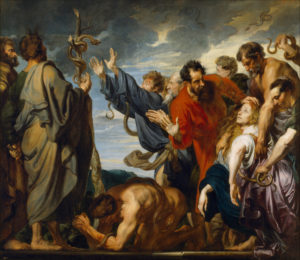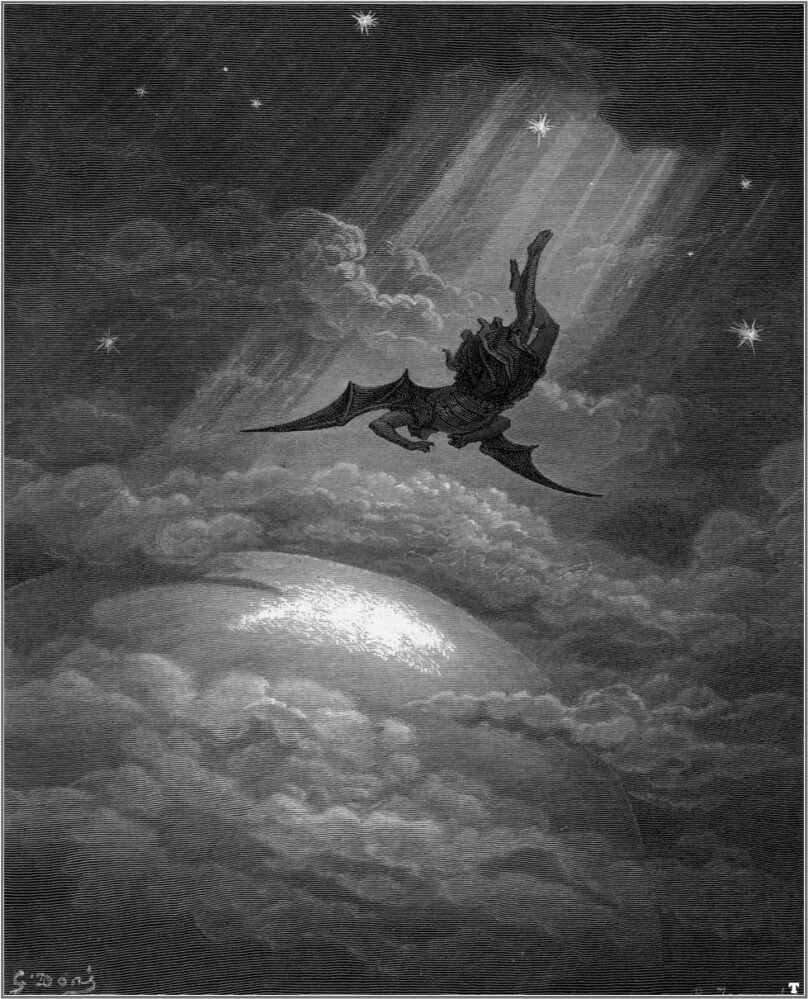He seized the dragon, that ancient serpent who is the devil and Satan, and bound him for a thousand years.
Revelation of Jesus Christ to John 20:2 CSB
A Sign for followers of Moses
The Apostle John mentions the serpent in Revelation and also as a sign to the Jews in the Gospel of John. Jesus knew well the symbolism presented to Nicodemus associated with Moses, but He presents a connection to the Cross and what the Lord will teach to all as the purpose of His Incarnation.
And as Moses lifted up the serpent in the wilderness, even so must the Son of man be lifted up:
John 3:14 KJV
You may have missed the familiar symbolism of the serpent in some translations using ‘snake’ or ‘bronze snake on a pole,’ so we will explore this from the Book of Numbers. But first, let’s return to the context of this conversation in John’s Gospel.
“Are you a teacher of Israel…?
We began our look at a theological debate between Nicodemus and Christ Jesus which the Apostle John records in God’s Love Through John: Of water and the Spirit. We associate Nicodemus mostly with Jesus’ clear answer to the initial question of the Israelite leader.
John 3:4 KJV Nicodemus saith unto him, How can a man be born when he is old? can he enter the second time into his mother’s womb, and be born?
Nicodemus is already old by measure of lifespans of his day. He is a ruler of the council and the most prominent Pharisee of the Temple, who must come to Jesus at night to have this conversation.
He receives reports from others, including Pharisees and other Temple officials sent to John the Baptist, who testified that Jesus IS the Messiah, the Promised One. And Jesus’ bold actions have already made this Messiah even more controversial than John the Baptist.
Most certainly, Nicodemus was either present at the Temple as witness to the earlier destruction by Jesus in the Temple courtyard, either as it happened or immediately after the disruption of the order of ritual sacrifices.
John 2:
15 After making a whip out of cords, he drove everyone out of the temple with their sheep and oxen. He also poured out the money changers’ coins and overturned the tables. 16 He told those who were selling doves, “Get these things out of here! Stop turning my Father’s house into a marketplace!”
Do you suppose Nicodemus and other officials of the Temple council had a few questions for Jesus about this incident during the profitable Passover pilgrimage festival? Of course they did.
John records (perhaps from a later memory after the Resurrection), 17 And his disciples remembered that it is written: “Zeal for your house will consume me.”
He quotes the scriptural songbook of Israel of the day.
from Psalm 69
- 4 They that hate me without a cause…
- 7 Because for thy sake I have borne reproach; shame hath covered my face.
- 8 I am become a stranger unto my brethren, and an alien unto my mother’s children.
- 9 For the zeal of thine house hath eaten me up; and the reproaches of them that reproached thee are fallen upon me.
- 12 They that sit in the gate speak against me…
- 19 Thou hast known my reproach, and my shame, and my dishonour: mine adversaries are all before thee.
- 21 They gave me also gall for my meat; and in my thirst they gave me vinegar to drink.
- 32 The humble shall see this, and be glad: and your heart shall live that seek God.
Zeal for the Temple; and reproaches of those who disgrace the LORD will shame the Son of Man, the Son of God to be lifted on a Cross!
Jesus is well-known to many witnesses. Nicodemus, no doubt, has both seen and heard the evidence of the Messiah, the Son of Man.
John 2:18
So the Jews replied to him, “What sign will you show us for doing these things?”
19 Jesus answered, “Destroy this temple, and I will raise it up in three days.”
23 While he was in Jerusalem during the Passover Festival, many believed in his name when they saw the signs he was doing…
The Sign of the Serpent
4 Then they set out from Mount Hor by way of the Red Sea to bypass the land of Edom, but the people became impatient because of the journey.
5 The people spoke against God and Moses: “Why have you led us up from Egypt to die in the wilderness? There is no bread or water, and we detest this wretched food!”
6 Then the Lord sent poisonous snakes [fiery serpents – KJV] among the people, and they bit them so that many Israelites died.
7 The people then came to Moses and said, “We have sinned by speaking against the Lord and against you. Intercede with the Lord so that he will take the snakes [serpents] away from us.” And Moses interceded for the people.
8 Then the Lord said to Moses,
“Make a snake image [a fiery serpent] and mount it on a pole. When anyone who is bitten looks at it, he will recover.”
9 So Moses made a bronze snake [a serpent of brass] and mounted it on a pole. Whenever someone was bitten, and he looked at the bronze snake, he recovered.
A Sign of Healing

The great symbolism of the snake raised in the wilderness connects
to the very power of the Lord and Creator as well as the intercessor for the people; in the wilderness, Moses, and in the presence of Nicodemus, the miraculous intercessor healer, Christ Jesus.
שָׂרָף saraph described as a poisonous serpent (fiery from burning effect of poison) is also the description found of a seraph or seraphim – majestic beings with six wings, human hands or voices in attendance upon God.
… and it came to pass, that if a serpent had bitten any man, when he beheld the serpent of brass, he lived.
Numbers 21:9b KJV
Are you a Teacher of Israel…?
John 3:
9 “How can these things be?” asked Nicodemus.
10 “Are you a teacher of Israel and don’t know these things?” Jesus replied.
Every teacher of Israel knows that the LORD requires sacrifice as substitution for sin. And all Pharisees knew the significance of the ‘Lamb of God,’ as the Prophet John had witnessed of Christ Jesus.
Teachers of the Law and the Prophets recognized the challenge of the analogy of Jesus. Jesus next addresses the association of the healing of the Cross and the Resurrection to Nicodemus.
John 3:
13 No one has ascended into heaven except the one who descended from heaven —the Son of Man.
14 And as Moses lifted up the serpent in the wilderness, even so must the Son of man be lifted up:
15 so that everyone who believes in him may have eternal life.
To be continued…








